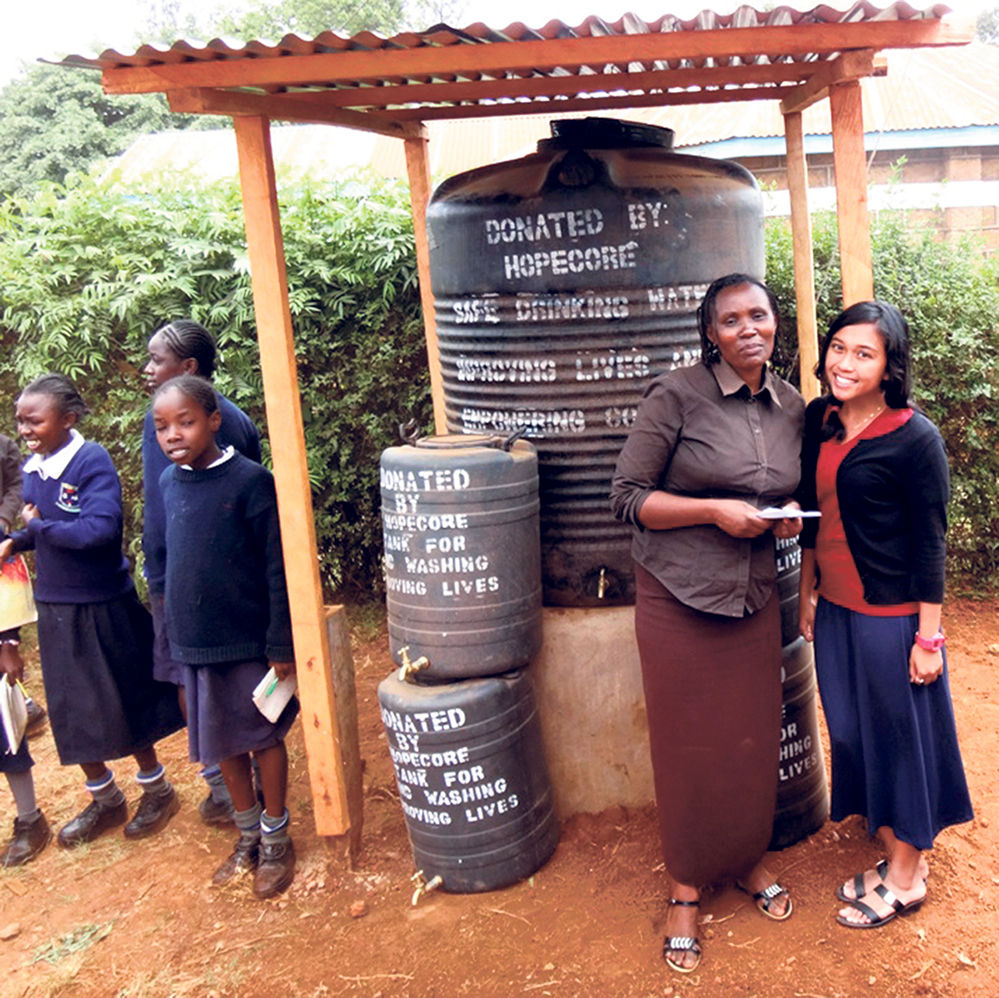To Kenya, with love
WAIMEA – Natasha Abadilla is known as a muzungus, or foreigner in Chogoria, Kenya, 140 miles northeast of Nairobi. It’s a long way from her roots on Kauai’s Westside. More than 10,000 miles away.
“People stare here,” Abadilla said.
But they stare at her not necessarily out of a sense of rudeness. The villagers are slowly becoming familiar with the 2010 Waimea High School valedictorian, who recently graduated with honors from Stanford University with a bachelor’s degree in human biology. She will be living in the poverty-stricken village in Kenya for a year, volunteering for a nonprofit organization.
“Here you just kinda sing, dance and roll with the punches,” Abadilla said.
The Global Health Fellow with Village HopeCore International is quickly adjusting to life in Chogoria.
“There’s a woman who we always buy our fruits and vegetables from, and she even saves milk and beans for us when we get to the market later than usual,” Abadilla said.
And then there are the guards posted outside the gates to the hospital compound where she lives in an apartment.
“They invite me over for tea and make sure we’re not paying too much for stuff at the market,” Abadilla said.
Increasing concern over the ebola virus nationally is mildly disconcerting for her.
“The only thing that’s making me a bit nervous is that, although Kenya is far, far away in Eastern Africa, the Western Africa ‘ebola scare’ has been creeping its way over, as Kenya has not suspended any flights from Western Africa. The government is choosing to do extensive health screening instead,” Abadilla said. “Other than that though, Chogoria really is a kind of bubble.”
The Stanford graduate finds her way around the area on foot, motorbikes and overcrowded public transportation. A stranger turned friend was recently a bit of good fortune during one of her four hour treks from Nairobi back to Chogoria.
“I was feeling exhausted from the night before and carsick from the bumpy ride home, but I couldn’t sleep it off because the driver would continually beep his horn,” Abadilla said.
The new friend helps her with her Swahili homework now.
“He brings me extra blankets when I’m a baby and complain about my apartment being freezing cold at night,” said Abadilla. “And he lets me steal all of his movies so that I don’t have to watch the same ones over and over again.”
But these changes for Abadilla are nothing compared to the living conditions of many of the villagers. She said the children are clearly poor and often have ringworm and no shoes.
“But they are more respectful and happier, by far, then children back home,” Abadilla said. “Instead of gluing their eyes to iPhones and video games, they explore and play with each other.”
Abadilla’s efforts in just a little over a month have opened her eyes to a whole new world. She said children seem happier in Chogoria than in America because they are more thankful for what they do have.
“Instead of crying and begging their parents to use their iPad or for a new video game, these kids are raised to find joy in simpler things, like playing with sticks and rocks and getting their own cup for water,” she said.
Abadilla is almost always busy. She works on the organization’s water, sanitation, and hygiene program, leads health education lessons, puts in hours at clinics and distributes mosquito nets to children.
“I wanted to become a fellow because I knew I wanted to do something meaningful and rewarding during my gap year before applying to med school,” she said.
Abadilla has explored Chogoria whenever possible and has found comforting similarities to Kauai.
“The town is on the way up to Mount Kenya, so the views are amazing, and since we’re close to the equator, a lot of the landscape reminds me of back home in Hawaii,” Abadilla said. “There are fresh fruits and vegetables at the marketplace every day, the same kinds that are back home — avocados, mangoes and bananas”
She utilizes the small gas stove in her kitchen to cook with the fresh ingredients from the market. Abadilla loves what is called githeri, a mixture of beans and maize. And yet she craves her mother’s barbecue chicken and other creature comforts.
“I miss the candy and snacks,” she said.
The land in Chogoria is a reminder of her roots.
“The dirt here is the same volcanic red dirt that we get in Kauai,” Abadilla said. “The view from my bedroom window here also looks strangely similar to my neighbor’s backyard back home in Kekaha.”
She also finds comfort in fellow workers.
“I feel really fortunate to be surrounded by people who not only care so much for the school children in the area, but also care a lot about their fellow co-workers and me,” Abadilla said. “The ‘ohana’ feeling and the, ‘It-takes-a-village-to-raise-a-child,’ mentality are extremely strong here, as they are back home.”
Her father Dan Abadilla said he is proud of his daughter’s global commitment.
“She wants to serve others,” he said.
Until she returns to her family and the beaches of Kauai she loves so much, she intends to avoid danger.
“I’ve seen elephant dung while riding through the forests. We quickly rode away, as you’d imagine being stuck on a motorbike facing an elephant wouldn’t be the best situation,” Abadilla said.
As far as any love connection opportunities in Kenya, she feels protected by a newly acquainted “surrogate father.”
“There’s a man who thinks of me as his daughter and kind of ‘shoos away’ all the men who wanna marry an American,” Abadilla said.
•••
Lisa Ann Capozzi, a features and education reporter can be reached at lcapozzi@thegardenisland.com

